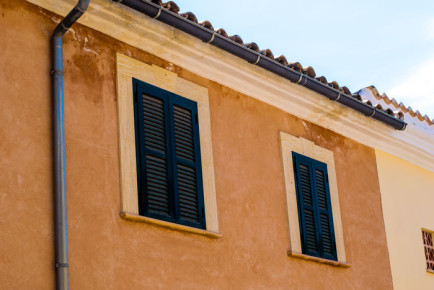
Blinds and shutters are a feature of traditional Spanish properties, and they have an interesting back-story.
Spanish newspaper El País ran a rather amusing exposé over the weekend, looking into the curious Spanish custom of window blinds, and what this says about the Spanish psyche.
If you’ve ever spent any amount of time in Spain away from typical hotels and resorts, you will be aware of the phenomenon: those heavy blinds that can block out even the brightest Mediterranean sunlight are a fixture on most residential buildings in Spain…
Obviously, the immediate answer reached for when enquiring why Spain seems to have such an affinity for these shutters is one of sunlight, or rather, shielding it. Spain is of course one of the sunniest and brightest nations in Europe, and among the hottest too, so in many ways seeking respite from the heat and light is understandable.
That said, Spaniards will also use their shutters in the winter too, when sunlight is in shorter supply. So the weather and climate has played a relatively minor role in the evolution of this peculiar cultural kink.
A ha, one might think – then what about privacy? Sure, blinds and shutters can certainly help on that front, but Spaniards are a wonderfully open and welcoming people, and while privacy is valued, so is good hospitality.
One Spain-dweller whom El País spoke to said that the country’s Arabic roots – which date back more than 800 years when many parts of the Iberian Peninsular were under Moorish rule – have echoed through the ages and are reflected even today in the architecture and behaviour of Spaniards.
Specifically, the story goes, Arabic cultures like their home to face inwards, towards a shaded central courtyard and with the outside world largely hidden from view. This would certainly seem to hold some truth when exploring some of the old towns of Spain, particularly Andalucía.
But even in modern, hip and open places such as Barcelona, window blinds are a stubborn feature. A sociologist interviewed for the article said that there was a distinct and deliberate contrast between how Spaniards act on the street – all openness and gregariousness – and how they behave in their home.
“Because of this greater closeness on the street,” Juan Carlos Barajas said, “there is more interest in learning about other lives and less interest in letting others know about theirs. That’s why they have to put up barriers.”
And this has been maintained and fortified through Spain’s Catholicism, he added. “Catholic ethics imply a greater concern for what will be said, for showing irreproachable conduct according to what is socially expected of you, for doing your dirty washing inside.
“So you have to put up a barrier – shutters and curtains that separate your house from the outside so you can do what you don’t want others to see you doing.”
So there you have it: for all Spaniards’ warmth and hospitality, in many ways they are just like the more reserved Northern Europeans, placing immense value on the sanctity of the home.
 en
en



 Vlaams-Nederlands
Vlaams-Nederlands
0 Comments
Leave a Comment
DISCLAIMER
The opinions and comments expressed by contributors to this Blog are theirs alone and do not necessarily reflect the views of VIVA Homes Under the Sun Ltd, any of its associated companies, or employees; nor is VIVA to be held responsible or accountable for the accuracy of any of the information supplied.
Have you got something to say?